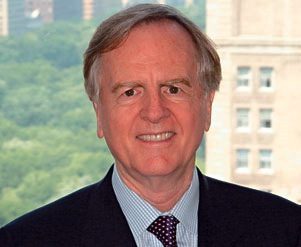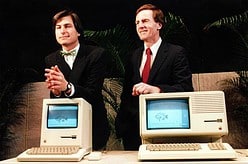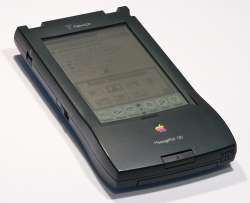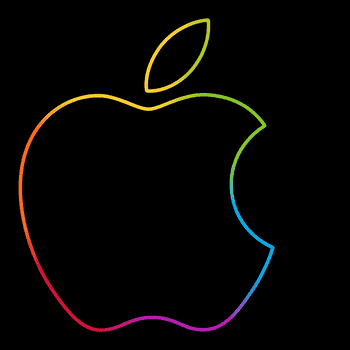 “De grootste fout die Apple ooit heeft gemaakt was mij aannemen.” Dat zegt voormalige Apple-president-directeur John Sculley in een interview met Cult of Mac. Sculley werd door Apple weggehaald bij Pepsi waar hij vice-president was en werkte van 1983 tot 1993 als CEO bij Apple.
“De grootste fout die Apple ooit heeft gemaakt was mij aannemen.” Dat zegt voormalige Apple-president-directeur John Sculley in een interview met Cult of Mac. Sculley werd door Apple weggehaald bij Pepsi waar hij vice-president was en werkte van 1983 tot 1993 als CEO bij Apple.
Sculley zegt in het interview het volgende over zijn aanstelling:
I was not the first choice that Steve wanted to be the CEO. He was the first choice, but the board wasn’t prepared to make him CEO when he was 25, 26 years old. They exhausted all of the obvious high-tech candidates to be CEO… Ultimately, David Rockefeller, who was a shareholder in Apple, said let’s try a different industry and let’s go to the top head hunter in the United States who isn’t in high tech: Jerry Roach.
They went and recruited me. I came in not knowing anything about computers. The idea was that Steve and I were going to work as partners. He would be the technical person and I would be the marketing person. The reason why I said it was a mistake to have hired me as CEO was Steve always wanted to be CEO. It would have been much more honest if the board had said, “Let’s figure out a way for him to be CEO. You could focus on the stuff that you bring and he focuses on the stuff he brings.”
Nadat Steve Jobs in 1986 werd ontslagen wist Sculley nog steeds weinig van computers. Hij begreep echter wel de manier van productontwikkeling van Jobs en het bedrijf is daarom doorgegaan op de ideeën van Jobs:
My decision was first to fix the company, but I didn’t know how to fix companies and to get it back to be successful again. All the stuff we did then were all his ideas. I understood his methodology. We never changed it. So we didn’t license the products. We focused on industrial design. We actually built up our own in-house design organization, which they have to this day. We developed the PowerBook… We developed QuickTime. All these things were built around Steve’s philosophy… It was all about sales and marketing and the evolution of the products. All the design ideas were clearly Steve’s. The one who should really be given credit for all that stuff while I was there is really Steve.
 In het interview probeert Sculley uit te leggen wat het geheim van Steve Jobs’ manier van denken en werken is. Het zit om onder andere in het karakter van Jobs, hij is een minimalist:
In het interview probeert Sculley uit te leggen wat het geheim van Steve Jobs’ manier van denken en werken is. Het zit om onder andere in het karakter van Jobs, hij is een minimalist:
If you go back to the Apple II, Steve was the first one to put a computer into a plastic case, which was called ABS plastic in those days, and actually put the keyboard into the computer. It seems like a pretty simple idea today, looking back at it, but even at the time when he created the first Apple II, in 1977 — that was the beginning of the Jobs methodology. And it showed up in the Macintosh and showed up with his NeXT computer. And it showed up with the future Macs, the iMacs, the iPods and the iPhones.
What makes Steve’s methodology different from everyone else’s is that he always believed the most important decisions you make are not the things you do – but the things that you decide not to do. He’s a minimalist.
Sculley geeft ook duidelijk aan wat het verschil is tussen Steve Jobs en Bill Gates:
The thing that separated Steve Jobs from other people like Bill Gates — Bill was brilliant too — but Bill was never interested in great taste. He was always interested in being able to dominate a market. He would put out whatever he had to put out there to own that space. Steve would never do that. Steve believed in perfection. Steve was willing to take extraordinary chances in trying new product areas but it was always from the vantage point of being a designer. So when I think about different kinds of CEOs — CEOs who are great leaders, CEOs who are great turnaround artists, great deal negotiators, great people motivators — but the great skill that Steve has is he’s a great designer. Everything at Apple can be best understood through the lens of designing.
John Sculley vertelt in het gesprek met Cult of Mac over hoe Steve Jobs de controle wil houden over de complete ontwikkeling van al zijn producten: van de hardware en de software tot de doos en de winkel. Jobs nam in de tijd dat ze samenwerkten volgens hem ‘elke beslissing’:
The user experience has to go through the whole end-to-end system, whether it’s desktop publishing or iTunes. It is all part of the end-to-end system. It is also the manufacturing. The supply chain. The marketing. The stores. I remember I was brought in because I had a design background and because I was a marketer. I had product marketing experience. Not because I knew anything about computers.
 Opvallend is dat John Sculley in het interview tegenspreekt dat de Newton bijna de ondergang heeft betekend voor Apple. De Newton was in 1993 één van de eerste PDA’s op de markt gebracht werd. Het was geen verkoopsucces en in 1998 zette Apple de productie stop.
Opvallend is dat John Sculley in het interview tegenspreekt dat de Newton bijna de ondergang heeft betekend voor Apple. De Newton was in 1993 één van de eerste PDA’s op de markt gebracht werd. Het was geen verkoopsucces en in 1998 zette Apple de productie stop.
Volgens Sculley heeft de Newton er echter voor gezorgd dat Apple het hoofd boven water heeft weten te houden:
The Newton was a terrific idea, but it was too far ahead of its time. The Newton actually saved Apple from going bankrupt. Most people don’t realize in order to build Newton, we had to build a new generation microprocessor. We joined together with Olivetti and a man named Herman Hauser, who had started Acorn computer over in the U.K. out of Cambridge university. And Herman designed the ARM processor, and Apple and Olivetti funded it. Apple and Olivetti owned 47 percent of the company and Herman owned the rest. It was designed around Newton, around a world where small miniaturized devices with lots of graphics, intensive subroutines and all of that sort of stuff… when Apple got into desperate financial situation, it sold its interest in ARM for $800 million. If it had kept it, the company went on to become an $8 or $10 billion company. It’s worth a lot more today. That’s what gave Apple the cash to stay alive.
So while Newton failed as a product, and probably burnt through $100 million, it more than made it up with the ARM processor… It’s in all the products today, including Apple’s products like the iPod and iPhone. It’s the Intel of its day.
Het complete interview met John Sculley over Steve Jobs is terug te lezen op de website van Cult of Mac. De website heeft naar aanleiding van het interview alle succesfactoren van Steve Jobs volgens John Sculley op een rijtje gezet.
Taalfout gezien of andere suggestie hoe we dit artikel kunnen verbeteren? Laat het ons weten!
Apple
Apple is het bedrijf achter de iPhone, iPad, Mac, Apple Watch en de andere mooie producten die we op iCulture bespreken, maar ook de vele diensten zoals de App Store, Apple Music, Apple Pay, iCloud en meer. Lees meer over Apple's CEO Tim Cook en de andere Apple-topmensen, hoe je contact opneemt met Apple Support en de Apple Stores in Nederland en België.

- Alles wat je wil weten over Apple
- Apple Park, het hoofdkantoor van Apple
- Apple's managementteam
- Alles over Apple CEO Tim Cook
- Alles over de iPhone
- Alles over de iPad
- Alles over de Apple Watch
- Alles over de MacBook
- Contact opnemen met Apple Support
- Apple Stores in Nederland: Amsterdam, Haarlem, Den Haag
- Apple Stores in België: Brussel en verder
- Alles over Apple's diensten
Reacties: 34 reacties